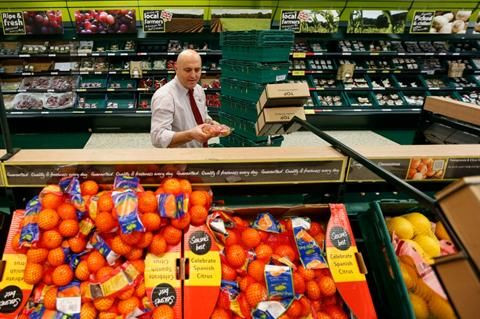Tesco Unveils Scale Of Food Waste, As 870 Million People Around World Go Hungry

Half of all bakery goods, 40 percent of apples, one-quarter of grapes, one-fifth of bananas and two-thirds of produce grown from salads are either thrown out or go to waste every year in Britain. The scale of wasted food in the United Kingdom came to light in a report issued by grocery retail chain Tesco PLC (LON:TSCO) and the Waste and Resources Action Program (WRAP), a British non-profit that seeks to cut waste in the food supply chain.
Tesco admitted that some 28,500 metric tons (almost 63 million lbs) of food were wasted inside its own supermarkets and distribution centers in just the first half of this year. Wasted food is also believed to cost the average British family some £700 ($1130) annually, according to Tesco.
To combat this massive wastage, Tesco said it will undertake a number of steps – including a cessation of its “multi-buy offers” on big bags of salad, removing the “display until” dates on fresh fruits and vegetables, and re-arranging its bakeries to cut down on the amount of bread displayed for public viewing. Tesco added, however, that food it could not sell was donated to poverty charity FareShare, or was converted into animal feed for livestock, or recycled into renewable fuel.
“We’ve all got a responsibility to tackle food waste and there is no quick-fix single solution. Little changes can make a big difference, like storing fruit and vegetables in the right way,” said Matt Simister, Tesco’s commercial director of group food. “We’ll be reviewing what else we can do. We’re working with our suppliers to try to cut waste at all stages of the journey from farm to fork.”
Of course, this is only one supermarket chain and its customers. WRAP estimated that in 2011 alone, some 15 million metric tons of food was wasted in the UK, most of that in households, not at distribution centers or supermarkets.
“Food waste is a global issue and collaborative action is essential if we are to successfully reduce it and reap the financial and environmental benefits of doing so,” said WRAP director Richard Swannell. “We welcome Tesco’s approach to tackling food waste across their whole supply chain and, by identifying the hot spots; they can tackle these areas effectively.”
This data on waste is particularly confounding given that the number of Britons using food banks has tripled over the past year, the New Statesman reported, as stagnant wages lose the battle against inflation, hurting household budgets. Moreover, the British government estimates that food waste costs the national economy some ₤12 billion every year, while the Institution of Mechanical Engineers reported that some 30 percent of food produced in Britain never even reach supermarket shelves, partially due to “cosmetic reasons.”
On a global scale, the waste of food is astounding. In September, the United Nations’ Food and Agriculture Organization (FAO) reported that 1.3 billion metric tons of food is wasted globally. Food that is wasted produces methane, a greenhouse gas, while the water used to grow the food could also be considered “wasted.” “In addition to the environmental imperative, there is a moral one: we simply cannot allow one-third of all the food we produce to go to waste, when 870 million people go hungry every day.” FAO director-general José Graziano da Silva said in a statement.
FAO’s report indicated that food waste is far more prevalent in the advanced countries than in emerging markets – in Europe and North America, on a per capita basis, 95-115 kilograms of food was wasted each year; while in Sub-Saharan Africa and South/Southeast Asia, the figure is only 6-11 kg/year. “Food waste in industrialized countries can be reduced by raising awareness among food industries, retailers and consumers,” FAO said. “There is a need to find good and beneficial use for safe food that is presently thrown away… Further research in the area is urgent.
Wastage of food is believed to be the third largest carbon emitter globally, after the US and China. The FAO has also estimated that if even one-fourth of the global food waste could be reduced that would be enough to feed the world’s hungry.
© Copyright IBTimes 2025. All rights reserved.





















